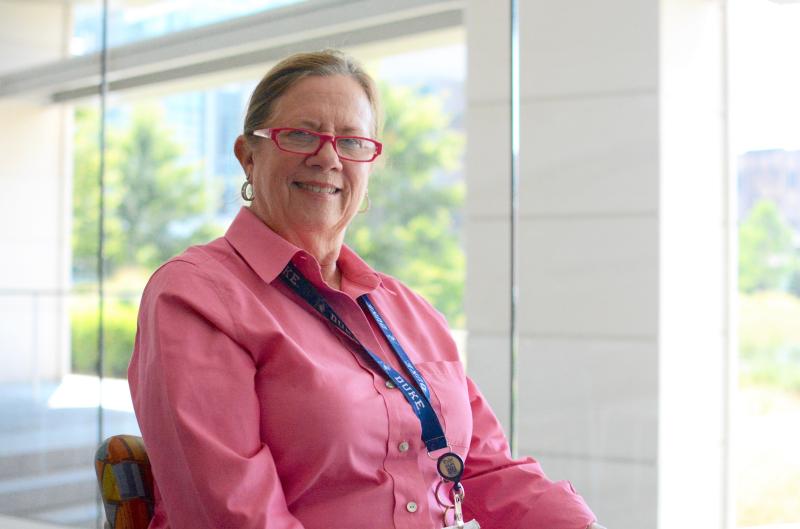
Working for the same company for years isn’t always the plan but when it happens, you witness changes that are unique. Linda Wilkins, division administrator of the Division of Hematology, was recently honored for her 50 years of dedication and commitment to Duke University this July by the Department of Medicine’s faculty and staff.
After Wilkins graduated from high school, a neighbor offered her a chance to apply for a job at Duke. After completing various tests to determine her qualification for a position, Wilkins, born in Greensboro and raised in Hillsborough, was offered a job in the university’s addressograph and mailing department.
“I was a little scared, since you’re learning new skills and in a work environment versus school. Initially, I worked on an addressograph machine, where you typed up names and addresses of alumni for mailings. Detail was very important, so you had to make sure your work was accurate.”
Before Duke, Wilkins said working wasn’t a priority since she spent most of her time taking care of her younger brother, who is seven years her junior. Both her mother and father worked. The two spent a lot of time roller-skating and riding bikes around the neighborhood where they lived. “My brother and I have a very close relationship, and he will tell you today, that I raised him - discipline and all.”
She held her position in addressograph and mailing for a few years before transitioning to the Department of Medicine. Wilkins recalls working with Leon Wheeler, who was a retired chief petty officer in the Navy, and was Business Manager of the Allergy and Respiratory Disease Division. Her initial position was with the Allergy Vaccine Lab, typing up orders for vaccines for patients. Wheeler approached her to take a position working with grants and contracts for the division, and that’s how her career started in the grants and contracts area.
Wilkins and Wheeler managed the grants for the hyperbaric unit, and she gained a lot of knowledge relative to Office of Naval Research Contracts and National Institutes of Health grants. She also spent some time typing up medical notes for the division chief at that time, Herbert O. Sieker, MD, and was able to gain a stronger knowledge base of medical terminology.
Wilkins’s work in the Allergy and Respiratory Disease Division would soon carry her to several positions in the Department of Medicine. Aside from working with grants and contracts for the Department, she was also trusted with handling the accounting for the Department of Medicine labs.
Wilkins was then recruited to the School of Medicine when they established a grants and contracts office for the medical center by Iris Hildebran, who had formerly worked in the Department of Medicine. This office reported to the Vice President for Health Affairs, William Anlyan, MD.
During this time, Wilkins decided to further her education. By day, she worked at Duke and by night, she attended Alamance Community College to study business administration.
“I stayed in the Grants and Contracts Office for over 18 years,” she said. “After that, I was recruited by Paul Thacker, business manager, and Joseph Greenfield, MD, Chair of the Department of Medicine, to manage the Department’s grants and contracts group”.
Wilkins has seen the Department of Medicine transform before her eyes as her career moved forward at Duke. She has seen Duke Hospital South grow from a very small, close-knit group to an institution of thousands of faculty and staff from around the world. She said one of the biggest changes she witnessed at Duke was the development of the different operating systems, which changed how everything operated throughout the university.
“I used to do grants on ledger paper. We would get stacks of printouts from the university and you would review grants and check all the items off to make sure they were correct. Everything was on paper. The computers really brought a whole new dimension to how we monitored things,” said Wilkins.
“I can remember the first Apple computer. It was so small. You can imagine how scary it was when we were given computers for the first time. Now look at where we are today. Technology has really changed a lot of the things we do.”
Wilkins said throughout her 50-year career at Duke, she has always worked with great leaders, faculty, and staff who have made Duke grow into the institution it is today. The staff and faculty members Wilkins has had the opportunity to work with have made her 50 years at Duke worthwhile and increased her love for her work.
“Looking back, it’s hard for me to believe that I’ve been at Duke for 50 years. You’d never think you would stay anywhere that long,” she said. “Duke has been good to me and I still enjoy my work here.”
For now, Wilkins isn’t worried about retiring. She plans to use her position at Duke to not only keep growing professionally, but also to help others. “I feel as if I’m still making an impact assisting others,” said Wilkins. “I’d like to continue in the future.”
This story was written by Tia Mitchell, communications intern for the Department of Medicine.